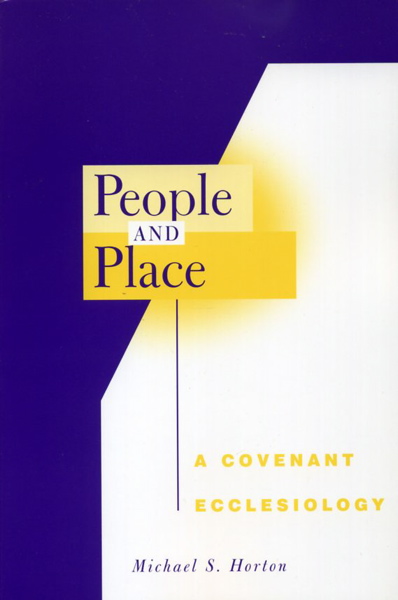
Michael S. Horton
Reviewed by: J. V. Fesko
People and Place: A Covenant Ecclesiology, by Michael S. Horton. Published by Westminster John Knox, 2008. Paperback, 325 pages, list price $34.95. Reviewed by OP minister J. V. Fesko.
The doctrine of the church, both in theory and in practice, is presently at low tide in the Reformed community. This inattention makes Michael Horton's People and Place a much-needed shot in the arm of the church. This book is the final installment of Horton's four-volume specialized systematic theology. This set is by no means for the faint of heart, but is a robust and learned exposition of Reformed theology, one that requires a careful and methodical reading. Some may shy away from this tome because at times it is somewhat technical and conceptually challenging. However, this is a necessary consequence of the depth to which Horton exposits the doctrine of the church and his efforts to engage competing schools of thought.
All too often, Reformed authors are satisfied with preaching to the choir, and so they remain in the ghetto of Reformed scholarship. This is not the case with Horton; he draws upon a wide range of scholarship: patristic to contemporary, Jewish to Christian, historically Reformed to the broader church, and liberal to conservative. Some might be critical of such an approach, and especially of him for publishing his work with a liberal Presbyterian press. However, the Reformed church has been in great need of a biblically grounded, confessionally faithful engagement with the broader church. In this respect, Horton has provided a "Paul at Mars Hill" engagement with what often amounts to unbelief disguised as "theology" in the church. Even people in the PCUSA need to hear the truth.
The book itself hinges largely upon the much-neglected but crucial ascension of Christ. All too often people conflate his resurrection and his ascension, but to do so is an error. It is Christ who in his absence pours out the Spirit upon the church in his ascension, and in so doing is present through the proclamation of the word and sacraments, the means of grace (pp. 1–34). It is Christ, through the Spirit, who both equips and guides the church on its pilgrimage to Zion, the New Jerusalem. Horton spends a significant amount of space discussing the means of grace (word and sacrament) and shows how vital they are to the life and well-being of the church (pp. 35–154). He also dwells upon other important issues, such as individuality versus community and the catholicity of the church (pp. 155–226). Horton addresses another doctrine that has been ignored over the years, that of vocation (pp. 302–7). Such an emphasis upon serving the world and loving one's neighbor is a welcome alternative to the misguided Kuyperian view of transforming culture.
All in all, the church owes Horton a profound debt of gratitude for his stimulating and confessionally Reformed treatment of ecclesiology. Anyone who studies, teaches, preaches, or writes on the doctrine of the church should consult People and Place.
December 14, 2025
December 07, 2025
November 30, 2025
November 23, 2025
November 16, 2025
November 09, 2025
November 02, 2025
© 2025 The Orthodox Presbyterian Church